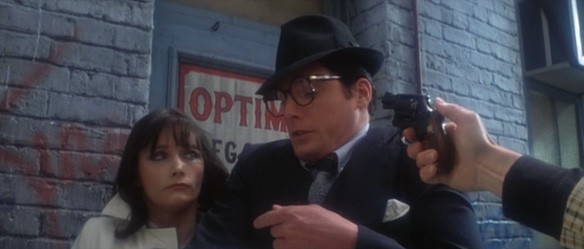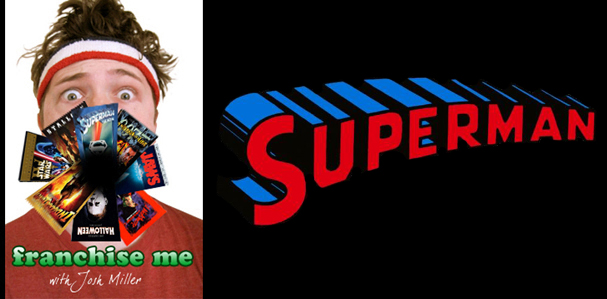
Hollywood loves a good franchise. The movie-going public does too. Horror, action, comedy, sci-fi, western, no genre is safe. And any film, no matter how seemingly stand-alone, conclusive, or inappropriate to sequel, could generate an expansive franchise. They are legion. We are surrounded. But a champion has risen from the rabble to defend us. Me. I have donned my sweats and taken up cinema’s gauntlet. Don’t try this at home. I am a professional.
Let’s be buddies on the Facebookz!
The Franchise: Superman: following the peacekeeping exploits of super-powered alien Kal-El, who was sent to Earth moments before his home-planet exploded, and was then subsequently raised by middle-American farmers under the name of Clark Kent. Created by writer Jerry Siegel and artist Joe Shuster as a comic book character, the franchise has expanded into pretty much every single conceivable medium, spanning from 1938 to the present. For our purposes here, we’ll only be examining the theatrically released live-action films.
previous installments
Superman (1948)
Atom Man vs Superman
Superman and the Mole Men
The Installment: Superman, aka Superman: The Movie (1978)
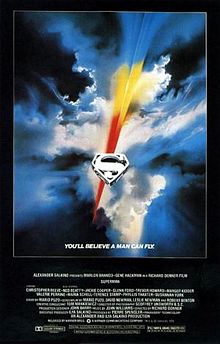
The Story:
Once again, we join Krypton mere moments from getting all explode-y. Jor-El (Marlon Brando) knows this will happen. But so dedicated to his job is he, that he takes time out of his busy doomsday planning to sentence a trio of criminals to banishment in the Phantom Zone. Then his planet dies. But not before he sends his son to Earth inside a high-tech ball of crystal spikes. After crashing to our planet, the spike-ball is found by simple farmers, who name the baby Clark and raise him to have awesome morals and self-restraint. As a teenager, Clark journeys to the North Pole and builds his dream home and reconnects with his father via a hologram. After staying there, and I guess training, learning, maturing, and sewing, Clark (Christopher Reeve) journeys to Metropolis as a fully fledged Superman. This proves poor timing for Lex Luthor (Gene Hackman), who is readying to do some major super villainy.
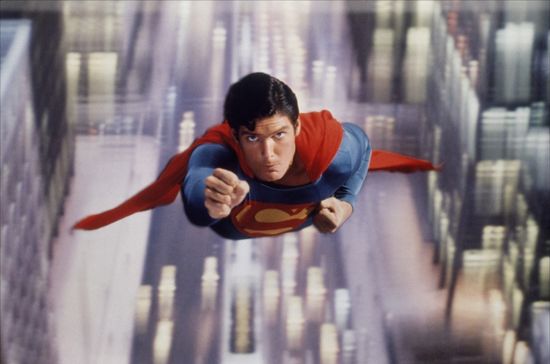
What Works:
Aside from trying to inject some sense of scope into what is admittedly a very narrow view of the full Superman franchise, part of the reason I wanted to start this Franchise Me series all the way back with the serials is that it makes talking about this film’s successes a lot easier. Out of context, Superman doesn’t seem like that much of a feat these days. The story is mediocre, and generally rather obvious. Not all of the characters click. It gets kinda silly at times. But the movie is a big win, and the success and impact of Superman lies in three basic early decisions: presentation, tone and the casting of Christopher Reeve.
Let’s talk presentation, because this project became interesting and unique the moment it started to move forward. Given the undying dominance the superhero genre has held on the American (and global) box office in the 21st-century, it is kind of crazy to reflect back on how many decades transpired between the rise of superhero comic books in the 1930s and the first appearances of proper superhero motion pictures. Prior to this movie, there really weren’t any, aside from Superman and the Mole Men and the 1966 Adam West-starring Batman, both of which were half-serious efforts, connected to a TV series. Superheroes only graced the silver screen in cartoons and serials. Doing a real superhero movie was a completely audacious idea. So we probably needed huckster-style producers, like Ilya and his father Alexander Salkind, to pull it off. The Salkinds had already made headlines and major bank for their ballsy (and shady) scheme to produce The Three Musketeers and its sequel The Four Musketeers by shooting them as one movie and then releasing them separately — a move that inspired SAG to create a new contract clause to ensure that no filmmakers could pull such a stunt again.
Superman wasn’t that popular anymore, mostly serving as a symbol of the hokier and simplistic early days of comics that had given way to more relatable characters like Spider Man and the X-Men (characters that were still hokey anyway). Yet Ilya Salkind envisioned doing a Superman movie, not as a junky B-movie or a winking joke like the Batman TV series, but as a massive spectacle film with lavish sets and eye-melting production values. This is old-hat now, but you can imagine how mad that seemed then, especially since this was all happening before Star Wars showed the studios that there was major money to be farmed in A-list interpretations of B-movie ideas. The Salkinds’ audacious attitude permeates Superman; even in 2013 – when the film no longer feels ground-breaking or even that special out of context – it is one of the film’s greatest strengths. Superman is a ridiculous character, the very epitome of “larger-than-life.” Capturing the essence of what makes the character interesting is hard to do if you don’t go all out. Mole Men had a lot of problems, but mostly the movie demonstrated that it is hard to make a compelling Superman story about the hero farting around in a small town yelling at irate hicks. He is a character screaming out for operatic storytelling! The posters for Superman featured the tagline, “You’ll Believe a Man Can Fly.” And that pretty much says it all.
Ilya Salkind wanted to make an audacious film (two films actually; though they had to pay the actors accordingly this time around). And the opening to Superman is about as audacious as the opening to a movie like this can get. Theater curtains part, revealing an issue of a Superman comic book accompanied by the narration of a little kid talking about the fictional character of Superman. It is a weird move. I can’t say this “works,” but it is fascinatingly odd. Its inclusion certainly speaks to what a novelty Superman was at the time. It acknowledges that Superman is a comic, a “children’s” property. Then the movie suddenly pulls the rug out and blows our faces off with one of cinema’s great orchestral theme songs, scoring an absurdly long and over-the-top credits sequence. Not unlike the opening to Star Wars, this is a “hello” that lets us know we’re in for something epic. And I’m not just talking about an epic budget. Salkind wanted to tell a full-on, old-timey hero story…
Richard Donner is the man who had to pull all this off, but the decision to go all in on Superman’s backstory began before Donner joined the project, back when The Godfather author Mario Puzo was somewhat improbably hired to pen the first draft of the screenplay. Spider Man and Batman Begins both feature extensive origins which eat up half their run-time, but in both cases the origins are part of the overall narrative, with the lead actor playing the role the whole time. Whereas Superman is practically broken down into movements. Kal-El doesn’t appear on screen until 14 minutes in, while we focus on set-up involving Jor-El and three seemingly irrelevant characters. Clark doesn’t speak until 26 minutes into the movie. And we don’t even see Christopher Reeve in the role until 48 minutes in — Mole Men was practically over by that point! While the meandering, lengthy set-up fosters the feeling of a Peer Gynt-esque epic story, it also manages to add more depth to Superman than the two serials or Mole Men had made seem possible. With well-cast Hollywood royalty like Marlon Brando and Glenn Ford going on at length about responsibility and whatnot, and with the film making an ambiguous time-jump that transitions Jeff East’s Teen Clark into Reeve (while in the Fortress of Solitude), it actually feels logical when the costumed Superman finally shows up in his classic too-perfect boy scout form. What had, in previous installments, felt like tame youth appropriate programming, now manages to come off with some genuine sense of purpose — it isn’t simplistic writing; Superman really is supposed to be a perfect being. The filmmakers found a way to flesh out ol’ Supes without re-inventing or re-interpreting the character. This is the classic Superman come to life. And contrasting this Superman against the previous installments highlights that Superman‘s achievement in this area is pretty impressive.
This is an obvious place to segue into Reeve’s casting. Reeve is perfect for the role. And not just because he looks right (though the demands of an A-list film finally forced the leading man to beef himself up, instead of awkwardly padding his suit). Kirk Alyn was chosen solely for his look, and only ended up feeding into the already dangerously flat elements of the character. George Reeves had talent and charm, but gave a uniform performance that completely ignored one of the most important aspects of the Superman myth — the dual persona of Clark Kent and Superman. As Tarantino summed up nicely in Kill Bill: Vol 2, “When Superman wakes up in the morning, he’s Superman. His alter ego is Clark Kent. His outfit with the big red “S”, that’s the blanket he was wrapped in as a baby when the Kents found him. Those are his clothes. What Kent wears – the glasses, the business suit – that’s the costume. That’s the costume Superman wears to blend in with us.” Tarantino presents this is as a philosophically dark revelation, but even when used for lighthearted laughs this is a fundamental part of what makes up Superman. No version of the character, not even the cartoons or radio program, embraces this element as much as Donner and company do. And this is the area where Reeve shines. His Superman is solid. And his Clark is solid. But putting the performances together really sings. It all looks effortless too. Kirk Alyn made Clark and Superman different, but this was accomplished by sagging his shoulders like a goon as Clark, and then flamboyantly puffing out his chest like a little kid as Superman…
Reeve sells the Superman/Clark contrast by making Superman his “normal,” instead of putting Clark and Superman at opposite ends of the posture spectrum. This not only strengthens the idea that Clark is a performance, but establishes a constant in the performance, instead of just swapping back and forth between too extreme personalities. It isn’t a radical interpretation, just someone finally taking things seriously enough to figure out how it should be done right. Reeve’s Clark is so much fun that it works to make us forget he’s Superman. He pretends he can’t open a bottle (forcing Lois to do it), he pretends to be a pussy when attacked by a mugger. And crazily, we actually take pleasure in seeing Superman overcome Clark’s loserdom, even though it was all a put on — this is kicking the Clark/Superman thing up a notch. Previously we’ve just been enjoying seeing Superman get away with his disguise, winking or smiling when his ruse has fooled Lois for another day. Getting us to empathize with Clark, as though he were somehow an underdog, is a whole new game. We triumph in seeing Lois fall all over herself for Superman, because it is following her dismissal and rebuffing of Clark’s romantic advances. But Superman is intentionally making Clark’s advances horrible! He wants Lois to turn Clark down, so, what, he can prove some sort of point? He’s just fucking with her! This isn’t Peter Parker using Spider Man to live out his fantasies. It is the exact opposite. Superman is enjoying play-acting like an unpopular loser. This adds a devilish hue to an otherwise square character. Which is good, because Reeve hits the charming boy scout thing full on and makes it work for him. He’s a sexy fella, but having to live his life in secret repression has also made him something of a nerd (another idea unique to this film; as far as the films go). Suddenly being a famous sex symbol is exciting for Superman, but Reeve sells us on the idea that instead of going out and banging groupies like Johnny Storm in The Fantastic Four (ie, any normal young man in that position), he sets his sights on Lois Lane, the somewhat frazzled girl he has a crush on. This makes the love story work. Superman has power; what he craves is normal intimacy. And interestingly, with Superman as the boy scout, Lois Lane comes off as the “bad girl.” She seems like she’s probably got some issues, and might be a nightmare to date. This is the element of 1978 that Margot Kidder infuses the character with. She isn’t a scrappy Hollywood ‘modern woman,’ but an actual modern woman. And I like it.
Richard Donner can take credit for casting Reeve and Kidder. He can also take credit for the film’s tone, which is the other crucial ingredient here. As I’ll get to in the next section, Superman can get too light and silly at times, but it was wise to err on that side of the fence versus the other. It is hard to take Superman too seriously, and this is the exact reason that Superman (and most comic characters) had/has a hard time getting respect. He wears a damn cape. For no reason. That’s silly, any way you slice it. (At least with Batman there is always the excuse of needing a disguise and something to instill fear yadda yadda.) The easiest way around this problem is just presenting the character for children, who don’t care about shit like that. Another way is lampooning it, like the Adam West Batman. Donner does neither, instead taking a Frank Capra-esque approach of unpretentious earnestness when dealing with Superman. With the budget and Reeve to back him up, he just lets Superman be Superman. The character is old-fashioned (hey, he’s been living at the North Pole since he was a teenager, cut him some slack!). So Donner lets Metropolis be a little old-fashioned too. Despite being post-Watergate, these Daily Planet offices are much less All the President’s Men and a lot more His Girl Friday, with Jackie Cooper’s Perry White giving J.K. Simmons’ J. Jonah Jameson a run for his money when it comes to cartoonishness. I don’t think it is a coincidence that this and Star Wars came out a year apart. Both films were something of a reaction to the realistic moral-gray-area of 1970s cinema, and both films embraced their morally black-and-white B-movie roots with total sincerity and with no attempt at coolness. There is something timeless about not being hip. So while the look of Superman is dated now, the movie itself feels like it could have come out in 1968 or 1958 or 1998.
John Williams. I don’t have much to add that you don’t already know. This is Williams at the height of his powers, when he really did have a Midas Touch with film scores. The Superman theme is powerful in its simplicity, which mirrors the very character of Superman himself. The movie would still be great with a lesser score, but having an iconic score just makes the film all the more iconic. I can’t imagine sitting through the film’s endless, cheesy credits without Williams’ theme. After the first few names zoom by you find yourself questioning, “Holy shit, are they seriously going to do every single credit like this?” Yet with the music, the credits are a blast! No one creates hero themes like Williams. Like in the Indiana Jones films, I love the way Williams will tickle and goose certain moments and scenes with little wisps of the Superman theme. Like the great bit where Ma and Pa Kent have just found baby Clark, and the Kent’s car almost falls on Pa while he’s changing the tire. Then suddenly the car stop falling, and the Kent’s look on with astonishment as a toddler cheerfully hoists up the back of the vehicle. The way Williams lightly threads in the theme here — so good.
Looping back to the character of Superman. I like the way the film colors within the lines, expanding upon and clarifying elements of Superman without actually changing anything. For example, I like that on Krypton – if you’re paying attention – all the politicians have different symbols on their chest, with Jor-El donning the famous Superman “S.” I like that it isn’t spelled out for us. There doesn’t need to be an explanation for the “S” on Superman’s outfit – people had already accepted the “S” for 40 years – but we’re given one should we interpret it. I also like the use of Lara, Superman’s mom. Superman is a tricky hero because he’s too powerful, which makes it hard to give the character proper pathos. I like this simple exchange between Lara and Jor-El as they’re about to send Kal-El to Earth…
Lara: He will defy their gravity.
Jor-El: He will look like one of them.
Lara: He won’t be one of them.
Jor-El: No. His dense molecular structure will make him strong.
Lara: He’ll be odd. Different.
Jor-El: He’ll be fast. Virtually invulnerable.
Lara: Isolated. Alone.
Right from the get go they’re pointing out the ways in which we should pity Superman. He’s all alone, an outsider. I like that teen Clark gets angry, kicking a football into space. I like that he needs to be talked down by Pa. He wants to show off, and it kills him that he can’t. He isn’t born a perfect boy scout. He is nurtured that way by two different parental forces.
The production values in the film are fantastic. The miniatures of Krypton are so stylized that they’re rendered timeless in their weirdness. The cinematography during the Smallville section of the film is at times breathtaking. Considering how old the film is, the flying FX are still mostly great. The only complaint I have is the same one I had when I was a little kid — why isn’t there more wind blowing on Superman (or Lois) when he flies?! I guess that wouldn’t look as classy. But Superman’s lift-offs and landings are done seamlessly. The days of the actor jumping into frame from off a ladder (or whatever) are happily behind us.
A lot has been made of Superman’s ending, in which – depending on your interpretation – Supes either travels back in time or reverses Earth’s rotation thereby reversing time. Both are almost equally insane, so I don’t see the point in quibbling, one way or the other. I think the movie needed an ending like this. Aside from focusing the drama on the love story, we needed an idea as preposterous as this to stick the landing, because by this point things had started to sag. Which brings us to…
What Doesn’t Work:
The lightness of Superman‘s tone cuts both ways. For all its strengths, the film comes up weak in the villain category. Gene Hackman, Ned Beatty, and Valerie Perrine’s boobs make for a fun trio. The problem is that a film this light and fun doesn’t need any comic relief. Superman is already saving cats, and leaving criminals’ boats in front of the police station. The villain should undercut these good-times, not build on them. More importantly though, the desire to make Lex Luthor a wacky villain is at odds with the film’s otherwise sincere presentation. It is something of a cop out. So while it is enjoyable watching Hackman goof his way through scenes, the execution prevents Luthor’s growing antagonistic force in the story from having any weight. He just isn’t a scary or threatening foe. I mean, Luthor has even fewer goons here than he did in the cheapie serial. The film presents him as TV-grade joke. Case in point, the montage sequence of Luthor trying to fuck with some military missile codes (the key step in his master plan). The gimmick of the sequence is that Luthor keeps sending Otis and Perrine’s Ms. Teschmacher to do the complicated/important part of the mission, and they keep fucking it up, so Luthor has to change plans and do it again. Wacka wacka. There is a great bit in the sequence involving Larry Hagman as a military officer who tells his men that an unconscious Teschmacher probably needs a “vigorous chest massage,” but scenes like these just make Luthor come off as bumbling and incompetent. Luthor isn’t a force to be reckoned with; the fact that his plan succeeds feels more like luck than super-villainy. When we’re just cutting away to Luthor in his lair yelling at Otis and talking about Superman’s arrival in Metropolis, that’s one thing. But the film loses a lot of steam once we enter the final “movement,” with Superman and Luthor going head-to-head. Suddenly nothing feels very big anymore. When Luthor captures Superman using Krypontite, how does Supes get free? Ms. Teschmacher just lets him go cause she thinks he’s cute and feels sort of guilty. Even the way this scene is staged feels small. Adding to the problem is that the film comes in “movements,” as I said. I would never describe the plot of Superman as being about Superman fighting Lex Luthor. That’s just one of the things Superman does on his journey on Earth. I don’t think that is a problem unto itself – given what the film is going for – but with Luthor being such a light-weight adversary, it exasperates things.
Body Count: 2. Plus everyone on Krypton.
Number of Times Superman Smugly Lets a Villain Shoot Him in the Chest: 0
Best Villain Dispatching: Superman doesn’t dispatch very many thugs in the film. But I like when he surprises a thief climbing up the side of a skyscraper by patiently standing horizontally on the building (as though it were the ground), just waiting for the thief to notice him. “Hi there. Something wrong with the elevator?”
Superman’s Superest Feat: Traveling back in time definitely takes the cake.
Best Use of His Brains: He doesn’t really do anything particularly super clever. Aside from traveling back in time, I suppose. That’s a clever way around death. But Superman is also kind of a fuck-up too. Why does he tell Lois that he can’t see through lead during their interview? He really shouldn’t spell out his few weaknesses like that. Especially not to a reporter!
Should There Be a Sequel: Heck yeah. I have a suspicious feeling we haven’t seen the last of those criminals Jor-El put in the Phantom Zone.
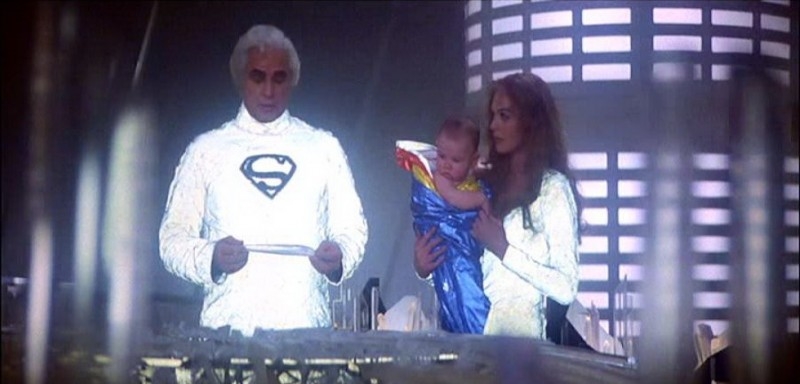
Up Next: Superman II
previous franchises battled
Alien
Back to the Future
Critters
Death Wish
Die Hard
Hellraiser
Home Alone
Jurassic Park
Lethal Weapon
Leprechaun
Meatballs
The Muppets
Phantasm
Planet of the Apes
Police Academy
Predator
Psycho
Rambo
Tremors
